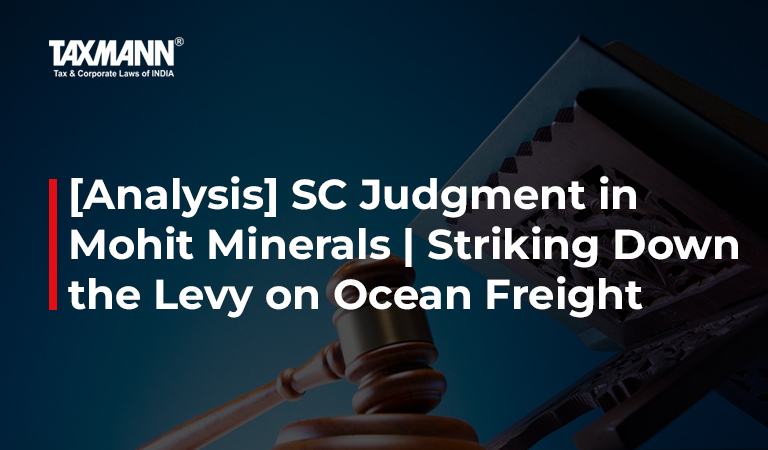
CA Sri Harsha – [2022] 138 taxmann.com 360 (Article)
The entire country is swayed by the Honourable Supreme Court’s verdict in the matter of
Union of India v.
Mohit Minerals (P.) Ltd.
1. This is completely unexpected decision after what we have seen in VKC Footsteps India Private Limited. The Supreme Court has struck down the obligation to pay tax under reverse charge mechanism by the importer. Earlier, the Gujarat High Court qua writ petition filed by
Mohit Minerals (P.) Ltd. v.
Union of India2, has held the notifications bringing the tax under reverse charge mechanism are ultra-vires the law. The said judgment was appealed before the Supreme Court by Revenue, which led to the current judgment. In this write -up, we shall analyse the decision delivered by Supreme Court.
The entire issue is, whether the importer is liable to pay tax on ocean freight services provided by foreign shipping line qua the foreign supplier under the reverse charge mechanism for the CIF contracts? The position under service tax law
3 and the analysis of the decision of Gujarat High Court
4 can be accessed here.
The Supreme Court after listening to the appellant (the Union of India) and the respondent (Mohit Minerals Private Limited) has opined on various issues, which are summarised hereunder:
On Nature of Recommendations of GST Council:
The whole issue arose as to whether the recommendations made by the GST Council are binding on the Union and States? The Supreme Court stated that the role of GST Council is a recommendatory body aiding the Government in enacting the legislation on GST and cannot be said to have a binding power on the Union and States. The conclusion was arrived on the reasoning that the provisions of Article
246A does not contain force which would convert the recommendations of GST Council into legislation. The Court stated that neither Article
279A does not also begin with a non-obstante clause nor does Article 246A provide that the legislative power is ‘subject to’ Article 279A. In absence of such a language, the argument canvassed by the Union of India that the recommendations of the GST Council are binding on Union and States is farfetched. The Court also stated that repugnancy provision that was contained as in Article
254 which was not present in Article 246A further indicates that recommendations of the GST Council cannot be said to be binding. The Court stated that there concurrent power exercised by the legislatures under Article 246A is termed as ‘simultaneous power’ to differentiate it from the constitutional design on exercise of concurrent power under Article 246, the latter being subject to repugnancy clause under Article 254. The Court stated that it is in the context of simultaneous legislative power conferred on Parliament and State legislatures, the role of GST Council has to be understood as a constitutional and recommendatory body and cannot be said the recommendations are binding on the Union and States.
On the Aspects of Recipient of Supply and Others:
The Court has struck down all the various submissions made by the respondent dealing with the taxable person, Section 5(1) to be only the charging provision, the prescription of rate of 10% of CIF through the main act and not through delegated legislation and others. The Court was seized only with the aspects – Whether classification of imports as a specific category of supply of shipping service is valid under Section 5(3) read with Section
5(1) of IGST Act and Whether the recipient of the imported goods is also a recipient of shipping services in CIF transactions under Section 5(3)?
Click Here To Read The Full Article
Disclaimer: The content/information published on the website is only for general information of the user and shall not be construed as legal advice. While the Taxmann has exercised reasonable efforts to ensure the veracity of information/content published, Taxmann shall be under no liability in any manner whatsoever for incorrect information, if any.





 CA | CS | CMA
CA | CS | CMA

One thought on “[Analysis] SC Judgment in Mohit Minerals | Striking Down the Levy on Ocean Freight”